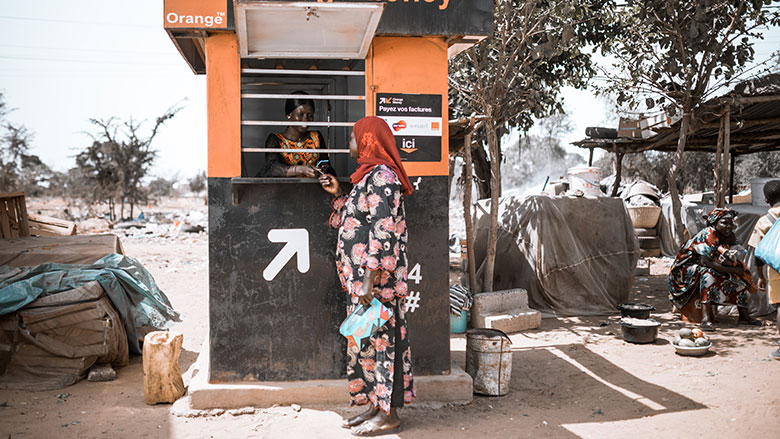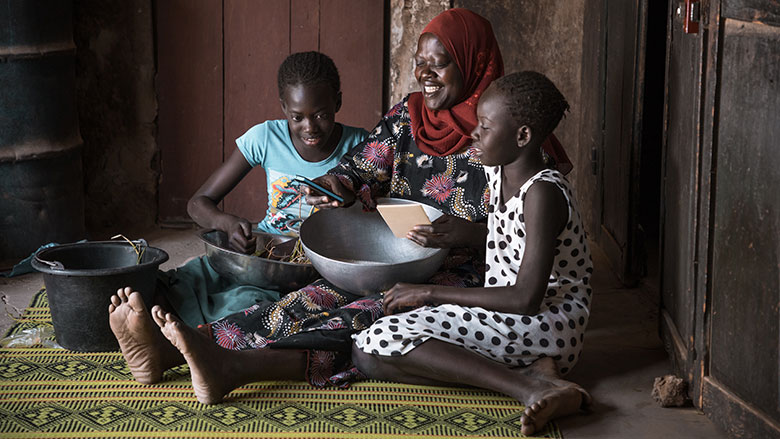Meeting basic needs and restoring dignity
The allowance was implemented by the Délégation à la protection sociale et à la solidarité nationale (General Delegation for Social Protection and National Solidarity DGPSN) with World Bank support through the Senegal Safety Net Project (PAFS).The beneficiaries can use this allowance to cover vital expenditure on food, school fees, and health, spending most of the money on food. “Whenever I receive the family allowance, I first head to the neighborhood shopkeeper to pay off the debts I incurred, mainly to give my children breakfast before they set off for school,” explains Adiouma Niang, a mother of four children attending school in Bayakh.
This is a boon for the local economy and shopkeepers. “When the family social security allowances arrive, there is a noticeable improvement in our business, because the recipients come from all the villages to buy from us,” notes Amadou Gaye, a shopkeeper in Kolda.
However, beyond the food that is purchased or the small-scale economic activity that is generated, the family allowance has restored the human dignity of some beneficiaries. As Ndeye Mbosse Mbengue, a member of the Yok Kom project in Kaolack, tearfully explains: “The family allowance freed me from slavery. I lost my husband, and I was living in extreme poverty with my young children and without any assistance. I had to make mud bricks, one by one with my own hands, to build the hut that I am living in. You will never be able to understand; the allowance pulled me out of the abyss of despair.” A sentiment that is echoed by the mother of Idrissa, a pupil at the school in Kaffrine, who was once shabbily dressed and had no school supplies. “Ever since I started receiving the family allowance, I feel more respected in the neighborhood. I can dress properly and take part in all the activities. Idrissa wears clean clothes every morning when she proudly sets off for school with her schoolbag on her back, like all the other children.”
Far more than an allowance, a behavior change support mechanism
Provision of the family allowance is conditional. To continue to receive the allowance, households are required to attend outreach sessions aimed at effecting behavior change in the areas of health, education, and civil registration in order to break the intergenerational transmission of poverty.
Thus, no fewer than 36,000 sessions are organized across the country every year for beneficiaries, with large numbers of community members also eager to attend in order to take advantage of the subjects discussed. “It's true, the money is important, but for me, the most important part is the knowledge that we gain during our periodic meetings, which allows us to better manage our children's and our own health,” states Maguette Thiaw, a 35-year-old resident in Thiès. For Safi Seck, who lives in public housing in Kaolack, the outreach sessions are very helpful: “I have an elderly person living with me, and attending the sessions helps me take better care of her.”
Some sessions also provide advice on how to better manage the household budget to ensure that needs are met and to establish priorities. “It is because I attended the outreach sessions that I prioritize buying what the children need for their studies when I receive the money. When I use the money to buy other things, my conscience bothers me,” Nafissatou Diouf points out.
A female community leader in Thiaroye-sur-Mer, Habiba Diagne uses these sessions to ensure that all beneficiaries in her group systematically register the births of all their children at the Bureau of Vital Statistics. “With me, no one can avoid registering with the vital statistics bureau,” she affirms.
In parallel, a government pilot project called Yok Kom, or “increase income” in Wolof, is helping cash transfer beneficiaries join community savings and loan associations. It is encouraging saving and small investment in more stable and lucrative activities to further support the ultimate goal of ending the poverty cycle.
*Names have been changed to protect beneficiaries’ identity.



